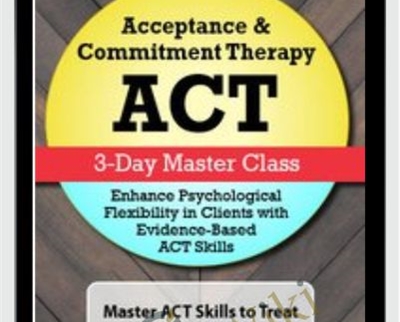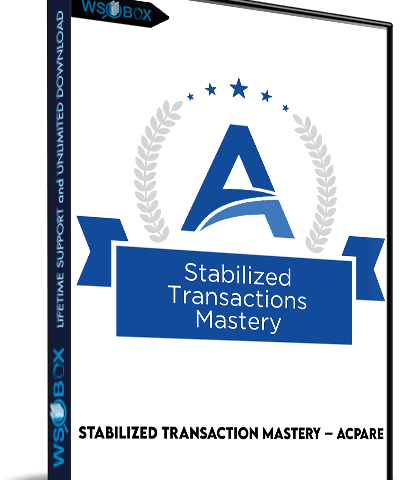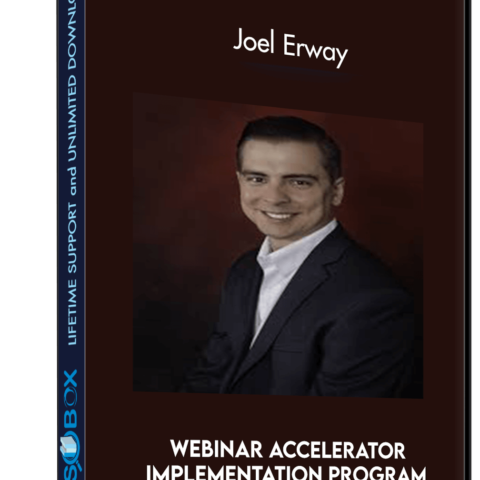Acceptance & Commitment Therapy (ACT): 3-Day Master Class – Jennifer Patterson
$234.00
Watch this breakthrough Acceptance and Commitment Therapy (ACT) master class to develop core competencies and transform your skills to achieve better therapeutic outcomes, even with your most challenging clients!
Description
Purchase Acceptance & Commitment Therapy (ACT): 3-Day Master Class – Jennifer Patterson Course at eBokly. We actively participate in group buys and are committed to sharing knowledge with a wider audience. What's more, our courses maintain the same quality as the original sale page. You have the option to buy directly from the sale page at the full price (sale page link is provided within the post).
Watch this breakthrough Acceptance and Commitment Therapy (ACT) master class to develop core competencies and transform your skills to achieve better therapeutic outcomes, even with your most challenging clients!
You’ll learn how ACT weaves mindfulness strategies with cognitive-behavioral change strategies to revolutionize some of the toughest clinical conditions.
This in-depth training includes step-by-step methods to:
- set an ACT consistent treatment plan
- build an ACT skills repertoire to use immediately with any client
- apply evidence-based ACT practices in a fluid and ongoing manner
Clinicians, like you, are experiencing improved outcomes for a wide range of clinical conditions including anxiety, depression, trauma, PTSD, and personality disorders.
Full of thought provoking lecture, engaging case studies and guided instruction, you will learn essential ACT skills that your clinical practice is missing to help your clients move forward in living a meaningful life. Leave this master class armed with tools you can use in your very next session.
Purchase now to revolutionize your client outcomes with the flexible and fluid ACT approach!
- Develop a deep understanding of the theoretical and philosophical foundation of the ACT model to help clients increase psychological flexibility.
- Use knowledge base of ACT as a contextual behavioral science and how it differs from Cognitive Behavioral therapies.
- Detect the six psychological inflexible processes which maintain psychological rigidity and understand how it pulls clients away from value based behaviors.
- Formulate ACT consistent case conceptualizations to understand avoidance and how it relates to maintaining away moves related to value based behaviors.
- Utilize ACT case conceptualizations to prepare evidence-based treatment plans to assist with a cohesive treatment approach.
- Utilize the six psychological flexible processes in ACT to facilitate emotional openness and increase psychological flexibility in clients.
- Analyze how ACT attempts to undermine problematic language obstacles and implement clinical skills to assist clients with getting unhooked from their thoughts.
- Use metaphors, analogies, and experiential exercises to improve clients understanding of self and increase value-based behaviors.
- Implement ACT evidence-based protocols and processes into treatment for specific disorders including depression, anxiety, trauma and the personality disorders.
- Synthesize core ACT interventions, like defusion, mindfulness, acceptance and the observer self, to increase clients value-based behaviors.
- Utilize ACT interventions, like contacting the present moment, to assist with developing observation and awareness skills for your client.
- Integrate the role of self-compassion in the ACT model and utilize exercises to help clients build self-acceptance.
- Create an effective and valued therapeutic relationship through the use of compassion-focused therapy processes.
- Develop an understanding of the ACT extension models and integrate core ACT techniques to use with trauma, adolescents, groups and couples.
- Incorporate awareness training from the Crosshairs model to help clients with trauma to effectively identify painful thoughts and feelings and determine behaviors as being helpful or unhelpful in an effort to increase valued living.
- Implement the core skills from the DNA-V youth model, like mindfulness and action, to support personal growth and improve psychological problems in adolescent clients.
- Demonstrate how to implement the choice point skills useful for in-the-moment integration of CBT and ACT to assist clients to respond flexibly to the situations that occur outside of sessions.
- Integrate core self-compassion techniques and awareness training to assist your clients with effective interpersonal functioning and increasing satisfaction in interpersonal relationships.
- Utilize the ACT Matrix in session with groups and individuals in order to improve client engagement and strengthen commitment to values-consistent behaviors.
Get Acceptance & Commitment Therapy (ACT): 3-Day Master Class – Jennifer Patterson, Only Price $237
Master the Core Skills & Competencies of ACT
The ACT Model
- What is Acceptance and Commitment Therapy
- Evolution of Third Wave Behavioral Therapies
- Outcome Studies
Foundations of ACT
- Contextual Behavioral Sciences
- Functional Contextualism
- Relational Frame Theory
- Happiness Trap
- Importance of Understanding for Clinical Practice
Case Conceptualization
- Experiential Avoidance as the Core Problem
- Creative Hopelessness Exercises
- Assessment Measures
- ACT Clinical Interview
- Inflexahex Diagnostic Model
Limitations of the Research and Potential Risks
- Children and adolescents
- Acute, florid hallucinations
- Catatonic depression
- Individuals with an adverse reaction to mindfulness exercises
Diagnostic Model: Six Core Processes of Psychological Inflexibility
- Experiential Avoidance
- Lack of Awareness
- Unclear Values
- Unhelpful Behaviors
- Attachment to Conceptualized Self
- Cognitive Fusion
Treatment Model: Six Core Processes of Psychological Flexibility
- Acceptance
- Mindful Decision Making
- Values Clarification
- Value-Based Behaviors
- Understanding Sense-of-Self
- Defusion
Interventions and Strategies
- Evidence-Based Processes and Practices
- Mindfulness Action Plan
- Commitment Plan Worksheet
- Integration of Evidence-Based Models CBT, DBT, CFT
- Role Play
- Videos
- Case Presentations
ACT Treatment Planning
- Suggestaflex Model
- Metaphors
- Paradoxical Processes
- Mindfulness Techniques
- Self-Compassion Exercises
- And Much More!
ACT in Action
Trauma
- Function of Trauma Symptoms
- Specify Treatment Goals
- Target Self-harm Behaviors
- Increase Psychological Safety
- Mindfulness Exercises
Anxiety
- 12 Week Protocol
- Control as the Problem
- Mindful Worry Sheet
- FEAR Algorithm
- FEEL Exposure Work
Personality Disorders
- Increase Emotional Tolerance
- Values Clarification
- Mind vs. Experience
- Target the Client’s Story
- Work with Client Anger
- Role of Therapist Self-disclosure
Depression
- 12 Week Protocol
- Reason Giving
- Rumination
- Story Telling
- Damaged Conceptualized Self
- Behavioral Activation
ACT Extension Models
Groups & Individuals: The ACT Matrix
- Simple Format for Groups and Individuals
- Five-sense Experiences
- Mental Experiences
- Toward Moves
- Away Moves
- The Four Quadrants
Trauma Prevention & Treatment: The Crosshairs Diagram
- Awareness Training
- Identify Painful Thoughts and Feelings
- Identify Situations as Being Helpful or Unhelpful
- Living Your Values at Work, Home, or in Other Important Areas of Life
Adolescents: The DNA-V Model
- For Adolescents, Parents, Teachers
- Based on Growth and Development
- Understand the 3 Processes and 2 Perspectives of Model
- Assist Adolescent with Handling Difficult Thoughts, Feelings, and Situation
- Discoverer Role
- Noticer Role
- Advisor Role
Outside of Client Session: The Choice Point Model
- Useful for In-the-moment Integration of CBT and ACT
- Target Situation Selection and Modification
- Values and Skills Section
- Modify the Form or Frequency of Inner Experience
- Respond Flexibly to the Situation and the Inner Experience
- Help the Client Identify and Use Strengths
Couples: The ID Model
- Assists with Conceptualization and Treatment of Interpersonal Relationship Issues
- Self-dislike
- Lack of Insight
- Emotional Avoidance or Attachment to Emotional Experience
- Self-compassion
- Self-awareness
- Self-acceptance
Get Acceptance & Commitment Therapy (ACT): 3-Day Master Class – Jennifer Patterson, Only Price $237
Tag: Acceptance & Commitment Therapy (ACT): 3-Day Master Class – Jennifer Patterson Review. Acceptance & Commitment Therapy (ACT): 3-Day Master Class – Jennifer Patterson download. Acceptance & Commitment Therapy (ACT): 3-Day Master Class – Jennifer Patterson discount.
Purchase the Acceptance & Commitment Therapy (ACT): 3-Day Master Class – Jennifer Patterson course at the best price at eBokly. Upon completing your purchase, you will gain access to the downloads page. where you can conveniently retrieve all associated course files. Additionally, we will send you a download notification email to your registered mail.
Unlock your full potential with our Acceptance & Commitment Therapy (ACT): 3-Day Master Class – Jennifer Patterson courses. Our courses are meticulously designed to empower you with the skills and knowledge needed for excellence.
Why wait? Take the first step towards greatness by acquiring our Acceptance & Commitment Therapy (ACT): 3-Day Master Class – Jennifer Patterson courses today. We ensure a smooth and secure purchasing experience that guarantees your peace of mind. Rest assured that your financial information is safeguarded through our trusted payment gateways, Stripe and PayPal.
Stripe, renowned for its robust security measures, offers a secure and dependable payment process. Your sensitive data is encrypted using state-of-the-art technology, ensuring its confidentiality throughout the transaction.
PayPal, a globally recognized payment platform, adds an extra layer of security. With its buyer protection program, you can make your purchase with confidence, knowing that your financial details are protected, allowing you to focus on your learning journey.
Is it secure? to Use of?
- Rest assured, your identity remains completely confidential. We do not share your information with anyone, ensuring the utmost security when you buy the Acceptance & Commitment Therapy (ACT): 3-Day Master Class – Jennifer Patterson course.
- 100% Safe Checkout Privateness coverage
- We employ robust communication and encryption methods to protect sensitive information. All card numbers are encrypted using AES at rest-256, and the transmission of card numbers occurs in a separate hosting environment, without sharing or storing any data.
How Will the Course Be Delivered?
- Upon successful payment for the “Acceptance & Commitment Therapy (ACT): 3-Day Master Class – Jennifer Patterson course”, Most of the products will come to you immediately. But for some products were posted for offer. Please wait for our response, it might take a few hours due to the time zone difference.
- If this occurs, kindly be patient. Our technical department will process the link shortly, and you will receive notifications directly via email. Your patience is greatly appreciated.
What Shipping Methods Are Available?
- You will receive a download link in the invoice or in YOUR ACCOUNT.
- The course link is always accessible. Simply log in to your account to download the Acceptance & Commitment Therapy (ACT): 3-Day Master Class – Jennifer Patterson course whenever you need.
- You can study online or download the content for better results, making it accessible from any device. Ensure your system does not go to sleep during the download process..
How Do I Track Order?
- We promptly update the status of your order following your payment. If, after 7 days, there is no download link provided, the system will automatically process a refund..
- We love to hear from you. Please don’t hesitate to email us with any comments, questions and suggestions.
You must be logged in to post a review.

 Purchase this course you will earn
Purchase this course you will earn 




Reviews
There are no reviews yet.